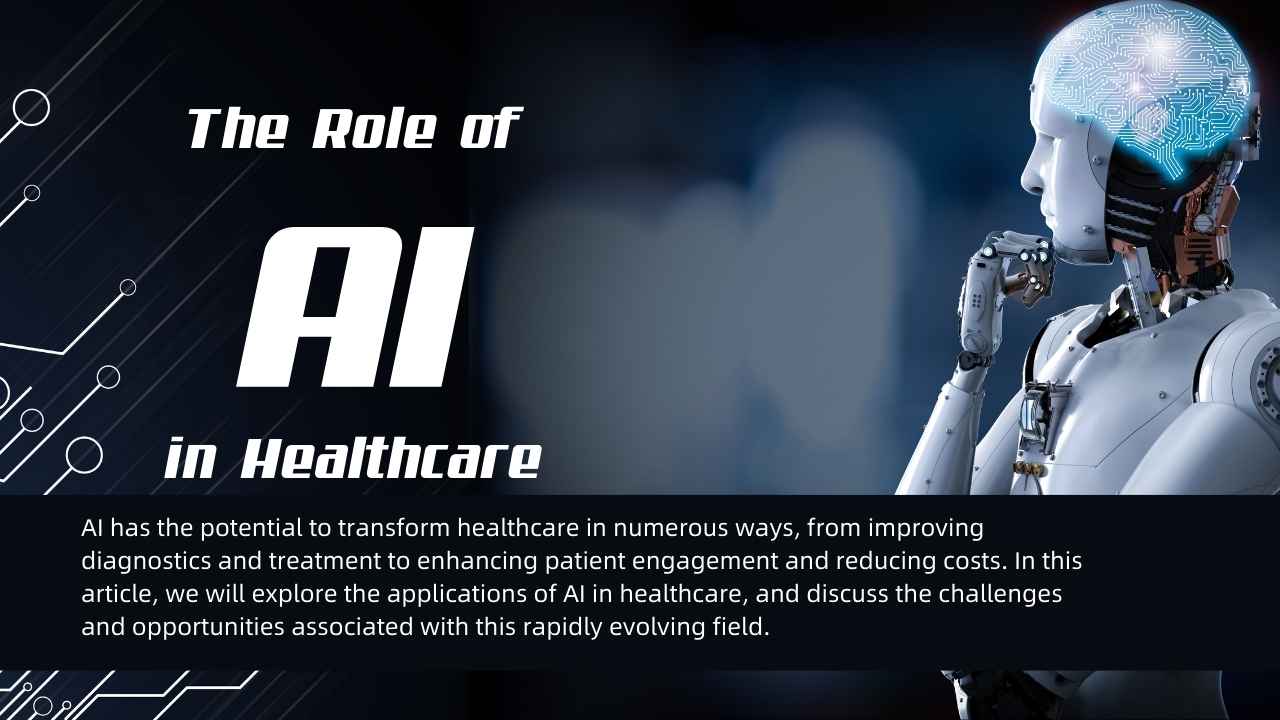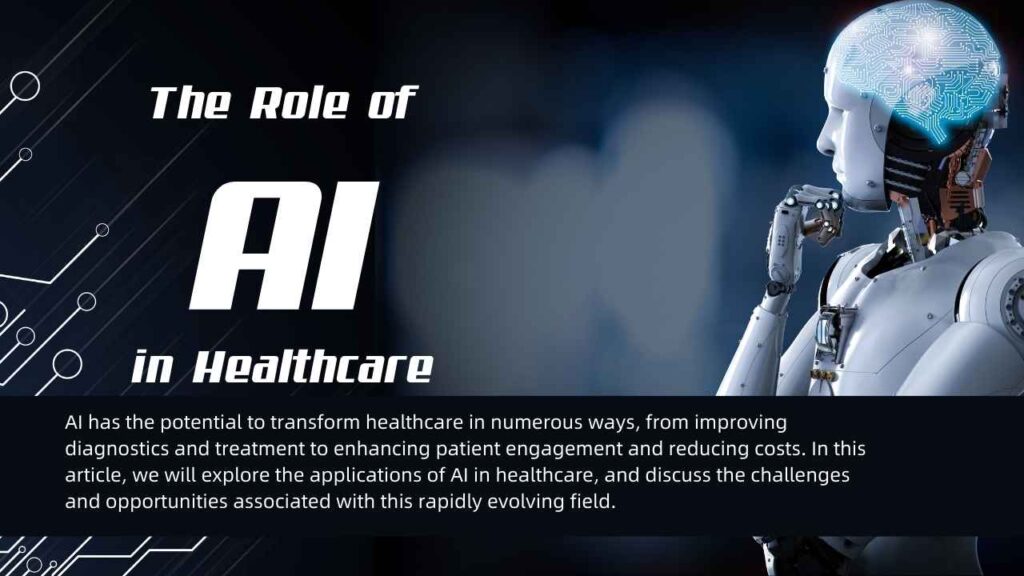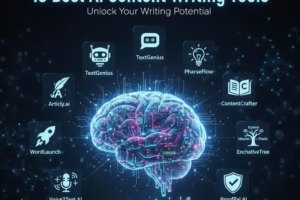
Artificial Intelligence in Healthcare: How AI is Revolutionizing Healthcare

Artificial Intelligence (AI) has rapidly become a key player in the healthcare industry, transforming every facet of the medical field from diagnostics to personalized care. As the technology advances, AI’s potential to enhance healthcare outcomes continues to grow. In this blog, we will explore the top applications of AI in healthcare, highlighting its benefits and future prospects while addressing ethical considerations.
1. Enhancing Diagnostic Accuracy with AI
AI’s ability to analyze large datasets at high speed has significantly improved diagnostic accuracy. Machine learning algorithms can now examine medical images such as X-rays, MRIs, and CT scans with remarkable precision, often outperforming human experts.
For instance, AI tools like Google’s DeepMind have demonstrated superior accuracy in diagnosing eye conditions and predicting patient deterioration. AI algorithms can also help detect early signs of cancers, heart diseases, and neurological disorders by recognizing patterns that are difficult for human doctors to spot.
This level of precision reduces the likelihood of misdiagnosis, ultimately saving lives and improving the overall quality of care.
2. Accelerating Drug Discovery
AI’s role in drug discovery is another critical area where it is revolutionizing healthcare. Traditionally, discovering and developing new drugs is a long, costly process that can take up to 10 years. AI dramatically accelerates this process by analyzing millions of data points, predicting how different compounds will behave, and identifying potential new drugs faster than ever before.
For example, companies like Insilico Medicine and Atomwise are using AI to identify drug candidates for diseases like cancer and Alzheimer’s. These technologies enable researchers to sift through vast chemical libraries, shortening the timeline for finding effective treatments.
In addition, AI models helped in the rapid development of vaccines during the COVID-19 pandemic, showcasing their potential to expedite responses to global health crises.
3. AI-Powered Personalized Treatment Plans
Personalized medicine is another exciting development in healthcare, and AI is at the forefront of this innovation. AI tools can analyze a patient’s medical history, genetic makeup, and lifestyle data to provide customized treatment plans.
For example, IBM’s Watson for Oncology uses AI to recommend treatment options tailored to the specific mutations of a patient’s cancer. By analyzing genomic data, AI can predict which therapies are most likely to be successful for each patient, minimizing side effects and improving outcomes.
As AI continues to refine its predictive capabilities, personalized treatments will become more precise, ensuring that each patient receives care tailored to their unique needs.
4. AI in Telemedicine and Remote Monitoring
With the growing demand for remote healthcare solutions, AI is playing a crucial role in enhancing telemedicine and remote patient monitoring. AI-driven chatbots and virtual assistants can manage routine healthcare queries, enabling healthcare providers to focus on more complex cases.
Wearable devices equipped with AI can continuously monitor patients’ vital signs and detect anomalies, alerting healthcare providers to potential issues before they escalate. For example, AI-powered smartwatches monitor heart rate, blood pressure, and glucose levels, providing real-time insights to both patients and doctors.
Telemedicine combined with AI enables better management of chronic conditions, reduces hospital visits, and allows patients to receive timely care from the comfort of their homes.
5. Ethical Challenges of AI in Healthcare
Despite the numerous advantages of AI in healthcare, ethical challenges must be addressed. One of the primary concerns is data privacy. AI systems require access to vast amounts of patient data, raising concerns about how this information is stored, shared, and protected.
Another ethical issue is algorithmic bias. AI systems can inadvertently perpetuate biases present in their training data, leading to disparities in healthcare outcomes. For example, if an AI tool is trained predominantly on data from a specific demographic, it may be less effective for underrepresented populations.
Additionally, accountability is a concern. When an AI system makes a mistake, it is often unclear who should be held responsible— the developer of the AI, the healthcare provider using the system, or the AI itself?
Addressing these ethical challenges is essential to ensuring that AI’s benefits in healthcare are accessible and equitable for all patients.
6. The Future of AI in Healthcare
As AI continues to evolve, its impact on healthcare will only grow. One exciting area of development is the integration of AI with other advanced technologies such as quantum computing and the Internet of Things (IoT). Quantum computing could enable AI systems to process even larger datasets, leading to more accurate predictions and better patient outcomes.
AI’s role in predictive healthcare is also expanding. In the future, AI systems may be able to predict diseases before symptoms even appear, allowing for earlier interventions and potentially preventing illnesses altogether.
Additionally, AI is poised to revolutionize global healthcare by providing access to diagnostic tools in underserved areas. AI-powered mobile apps could enable patients in remote regions to receive accurate health assessments without needing to visit a specialist in person.
7. AI-Powered Surgical Assistance
AI is also making waves in the field of surgery. Robotic systems guided by AI algorithms are now assisting surgeons in performing complex procedures with greater precision than ever before. These systems can provide real-time guidance, reducing the risk of human error and improving patient outcomes.
For example, Da Vinci Surgical System, powered by AI, assists surgeons in performing minimally invasive surgeries, resulting in shorter recovery times and reduced complications for patients.
As AI advances, we can expect to see even more integration of AI-powered systems in the operating room, further enhancing surgical precision and patient safety.
8. AI and Mental Health
AI is not only revolutionizing physical healthcare but also making strides in the field of mental health. AI-powered apps and virtual therapists, such as Woebot, use natural language processing to offer mental health support, providing timely interventions for individuals experiencing anxiety or depression.
AI can also analyze speech patterns and social media activity to detect early signs of mental health issues, allowing for proactive treatment before conditions worsen. This democratizes access to mental health services, especially for individuals in regions with limited access to mental healthcare professionals.
9. Challenges to Widespread AI Adoption
While AI holds immense potential for revolutionizing healthcare, there are still challenges to its widespread adoption. One challenge is the high cost of implementation. Developing, deploying, and maintaining AI systems can be expensive, making it difficult for smaller healthcare providers to adopt these technologies.
Moreover, there is a skills gap in healthcare when it comes to utilizing AI effectively. Healthcare professionals need proper training to interpret AI results and integrate them into patient care. Bridging this gap will require significant investments in education and training programs for healthcare workers.
10. Conclusion: A New Era of Healthcare with AI
AI is transforming healthcare in ways that were once unimaginable. From improving diagnostic accuracy and speeding up drug discovery to enabling personalized treatments and enhancing telemedicine, AI is revolutionizing patient care. However, as we embrace these advancements, it is essential to address the ethical and practical challenges they present.
As AI technology continues to evolve, it will play an increasingly important role in shaping the future of healthcare, offering a more personalized, efficient, and accessible approach to medical care

